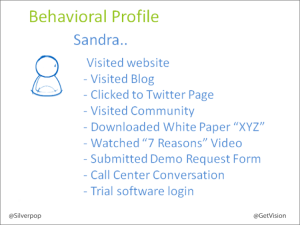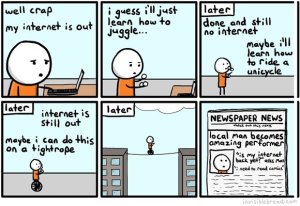Online Identity
An online identity is a networked identity adopted in cyberspace by an individual, organisation or electronic device.
To me, an online identity is like a virtual girlfriend who knows you very well and likes to show your everything off to the world.
According to Internet Society, an online security company has identified more than 200 Third-Party advertisers with more than 630 Tracking Technology tracking the various websites that one visits. Every actions on the various social media are stored and commercialised.
Silverpop.com, 2014
I used the hashtag ‘#Marketing’ on WordPress and Twitter for this module. I’ve gained 6 new unknown Twitter followers from marketing agencies.

Is it healthy to have more than one online identity?
It’s 2014, social media is everywhere! As of November 2014, there are 1.35 billion users of Facebook. 91% of today’s employers use social media to check out on the interviewees’ personal life, which 76% checking their Facebook accounts and 53% checking Twitter. (Undercover Recruiter, 2011)
Some like to separate their private and professional lives to show their employers that they are well-behaved and worthy to be hired, while boosting the image of the company.
Simply put, people have more than one online identity to protect their own reputation and preserving their freedom.
What’s not good about having more than one?
Number one, I feel that it is rather difficult to manage and maintain various online identities. It is troublesome to update two accounts in today’s world when we need more than 24 hours a day to do our work!
Secondly, it is easy to create an account on any social sites. No one usually reads the ‘Terms and Conditions’ before creating a new account. This is where cyber-bullying comes into play. I had this friend who created another Facebook account with a face of a pretty girl as the profile picture to trick his other friend. He managed to ‘cyber-date’ this friend for 6 months. Both were guys.
This is a rather smart way to scam and criticise people. Racist remarks (illegal in Singapore) could be thrown to people from an unknown social media account. Money scamming where some are tricked into paying for nothing.
What do I think?
All in all, to me, it does not really matter whether or not I have a separate account where my employers would only see the ‘good’ side of me. I feel that, as marketers, we should be able to show our wild side of us to our employers. Usually these wild people are fun-loving and creative, that is what is needed in marketers.
Warburton, S. 2010. Rhizome Digital Identity Matters. [Online] Available at: http://digitaldisruptions.org/rhizome/wpcontent/uploads/2010/06/rhiz08_DigitalIdentityMatters.pdf [Accessed 1 Dec. 2014].
YouTube, (2014). Four Reasons to Care About Your Digital Footprint. [online] Available at: https://www.youtube.com/watch?v=OA6aiFeMQZ0#t=100 [Accessed 1 Dec. 2014].
Silverpop.com, (2014). Silverpop – 5 Steps to Behavioral Marketing Success. [online] Available at: http://www.silverpop.com/blogs/email-marketing/behavioral-marketing-steps.html/blog_5-steps-to-behavioral-marketing_bb_final-2 [Accessed 1 Dec. 2014].
Leading social networks worldwide as of November 2014, r. (2014). Social networks: global sites ranked by users 2014 | Statistic. [online] Statista. Available at: http://www.statista.com/statistics/272014/global-social-networks-ranked-by-number-of-users/ [Accessed 1 Dec. 2014].
Undercover Recruiter, (2011). How Employers Use Social Media To Screen Applicants [INFOGRAPHIC]. [online] Available at: http://theundercoverrecruiter.com/infographic-how-recruiters-use-social-media-screen-applicants/ [Accessed 1 Dec. 2014].





